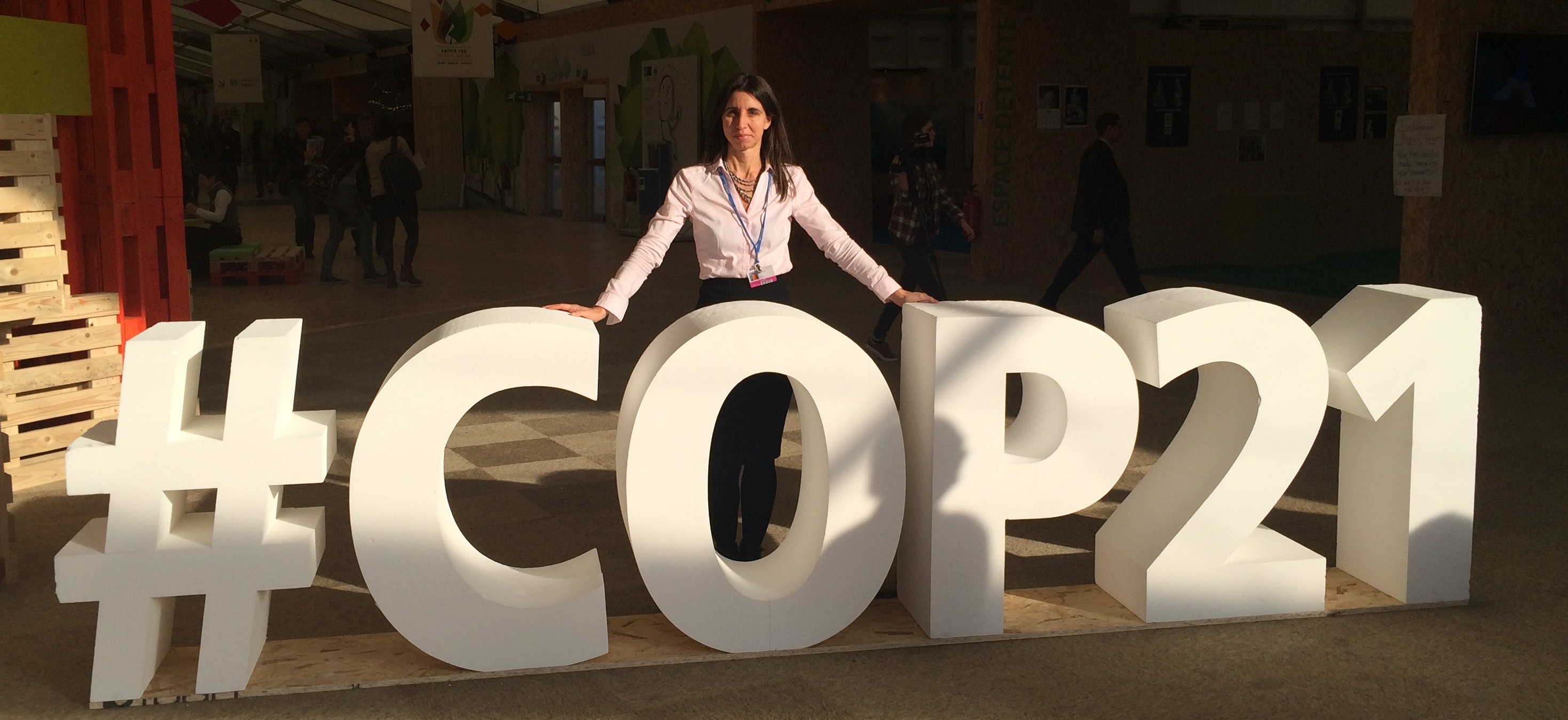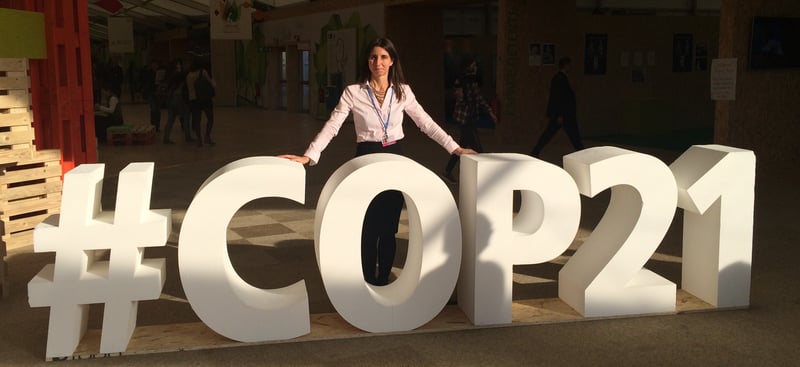How One Kroc School Alum Is Focusing Her Peacebuilding on Environmental Protection

How One Kroc School Alum Is Focusing Her Peacebuilding on Environmental Protection
begin quoteFifteen years after leaving my work in conflict areas, I am again sitting in meetings to discuss how to keep human beings safe.
The following post was contributed by Kroc School Master’s in Peace and Justice alumna Susi Menazza ’03 (MA). She is currently the Director of Global Institutions at The Nature Conservancy.

Susi Menazza at the 2015 United Nations Climate Change Conference, also known as COP 21, which negotiated the Paris Climate Agreement.
It is difficult these days to watch the news and not feel helpless against the seemingly unstoppable power of a changing climate. For me, born and raised just outside Venice, Italy, the recent images of the devastating floods hit a very personal spot. It is always harder when it is your backyard.
Scientists warned us for decades that increasing greenhouse gas emissions by burning fossil fuels — not only to meet our basic needs such as warming our houses, going to work, bringing food to our tables, but to feed our insatiable over-consumption — would disrupt key weather patterns with dire consequences. I remember sitting at the U.N. Climate Negotiations in 2008 watching presentation after presentation by scientists from every possible field and institution talking about their studies. “More floods, more destructive storms, more heatwaves, more droughts.” They pushed hard for governments to find a solution, but the world wasn’t ready. The negotiations failed in 2009 and a new attempt to find common ground did not succeed until 2015 with the Paris Agreement.
As I sat through many meetings and endless negotiations, nature’s odd patterns became evident to everyone. Then they became dangerous. When I shifted the focus of my peacekeeping career and started working for The Nature Conservancy (TNC) almost 15 years ago, I honestly thought that the days spent discussing how to keep human beings safe were behind me. Yet, according to the latest Global Report by the Internal Displacement Monitoring Center, in 2018 16.1 million people worldwide were displaced due to extreme weather events. That’s a staggering number considering that those displaced by conflicts were 10.8 million.
Climate change takes a tremendous toll on people, but it also affects nature and that, as in a loop, hurts people even more. When entire forests go up in flames, like in California and in Australia, it is not just the trees that we lose, but also their ability to hold the soil in place. Free from the grip of roots, soil slides into rivers and pollutes the water that people rely on. When tourist destinations are hit by storms that damage their natural attractions, the economies of entire communities can suffer, often for years. The list goes on and on.
When I am not locked in windowless U.N. conference rooms, my job brings me to many incredible places around the world to see the work of TNC and its partners. So for me and for the many others who work in conservation, climate change means that beloved lands, waters, plants and animals we have spent so much time advocating for and protecting are deeply affected. Changing temperatures are a big deal if you are a creature that only survives in a certain environment.
As we all know, the solution requires us to make some really significant changes. We must stop relying on oil and coal and instead support our economies with a range of alternative energies. I have to admit that sometimes this feels like a monumental challenge, yet I have never been more optimistic. This crisis offers the unprecedented opportunity to think of solutions that are completely out of the box and has unleashed waves of innovation and entrepreneurship across the globe. Many new ideas focus on technology – solar, wind, tidal. However, what people might not know is that nature, far from being just a victim of climate change, is also one of the most powerful tools we have to fight climate change.
Let me start with trees, as forests are phenomenal ‘carbon sponges’. Absorbing carbon dioxide from the air is literally what trees do for a living. A famous study estimates that forests worldwide can remove about one-third of the emissions caused by fossil fuels, so helping keep global warming at bay. For free. You don’t need technology to create a tree. They create their own seeds. You don’t need spare parts. They grow their own branches. You just need to leave good forests intact and restore those that need help. This is why countries these days are almost competing with each other to plant trees. India and Ethiopia with 66 million and 350 million trees respectively planted in just 12 hours, and New Zealand’s announcement of 1 billion trees to be planted by 2028, are just a handful of many exciting examples.
Identifying, testing and measuring how nature can contribute to solving some of the world’s most pressing problems is a big focus at TNC. We call these “Nature-based Solutions,” and they include some of the most exciting ideas for investing in nature I have ever worked on. Let’s take coral reefs. They are beautiful, and we knew that when storms hit coastal areas, reefs also act as barriers against the water. We just did not know exactly how much they helped. So we hired an engineering firm to measure the protective power of the reef in Cancun, Mexico. The results were shocking. A healthy reef absorbs up to 97% of the wave’s energy. It effectively acts as a cement sea wall, except that it can build and repair itself, supports fisheries, attracts tourists, and is beautiful to look at.
As the director of the Global Institutions team, it is my job to channel our ideas to governments and multilateral institutions, providing concrete examples of Nature-based Solutions that they could integrate into their strategies, policies and public funding. This to me is one of the greatest advantages of working for a nonprofit. While governments hold enormous decision-making power, they are by design set up to avoid innovation and risks, and rightly so. But they can embrace the innovations that businesses, nonprofits, and others have successfully tested and implemented.
Having protected millions of acres throughout its 65-year history, TNC has experience and credibility, which makes my work with governments easier. But what makes my job really exciting is being in a meeting with smart people and feeling the energy building up when a new idea takes shape. TNC knows that exceptional times demand new thinking, new partnerships, new ways to integrate nature into the solutions, and I am lucky to operate in an environment that encourages all of this. As a result, my meetings are full of “What if…”
“What if we convinced one of the biggest insurance companies in the world to create the first insurance product on a natural asset so that hotels and resorts in Cancun can conserve the coral reef that protects them?”
“What if we could buy and restructure the foreign debt of a country so that the government can invest in climate change protection measures?”
“What if we bring private investments to conservation?”
Seeing Nature-based Solutions embraced by businesses and governments that understand the value of investing in nature is more than any pragmatic tree-hugger like me can ask for. But as much as I love nature, the most important reward is to contribute to ideas that protect people and communities around the world. Fifteen years after leaving my work in conflict areas, I am again sitting in meetings to discuss how to keep human beings safe. Except that this time it is with solutions that are long-term, sustainable, good for the planet, and, hopefully, also fighting climate change.
At the Kroc School, we are educating for peace and social innovation. Ready to join us? Learn more about the Kroc School and its graduate programs.
Contact:
Justin Prugh
jprugh@sandiego.edu
(619) 260-7573

About the Author
The Joan B. Kroc School of Peace Studies (Kroc School) at the University of San Diego is the global hub for peacebuilding and social innovation. Founded in 2007, the Kroc School equips the next generation of innovative changemakers to shape more peaceful and just societies. We offer master's degrees in peace and justice, social innovation, humanitarian action, conflict management and resolution, and a dual degree in peace and law — programs that have attracted diverse and dynamic students from more than 50 countries. In addition to our graduate programs, the Kroc School is home to the Kroc Institute for Peace and Justice (Kroc IPJ). Founded in 2001, the Institute supports positive change beyond the classroom. Through groundbreaking research, experiential learning, and forward-thinking programs, the Kroc School and Kroc IPJ are shaping a future in which peaceful co-existence is the new normal.





